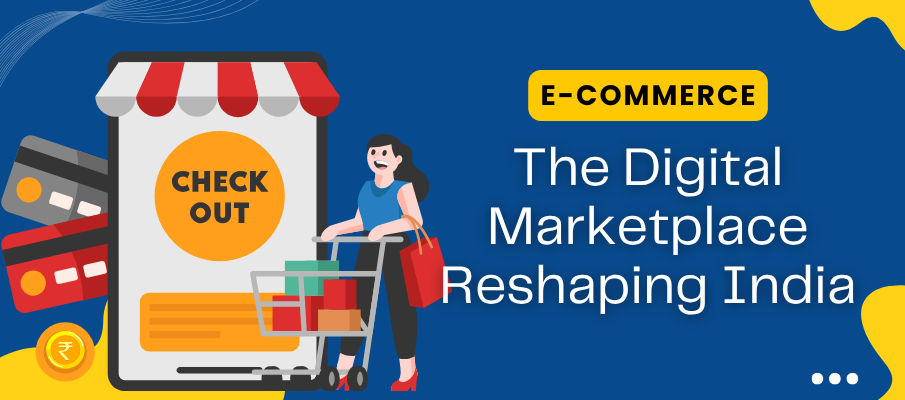
Not long ago, shopping meant stepping out, strolling through crowded markets, haggling with vendors, and carrying heavy bags back home. Today, with just a few taps on a mobile screen, groceries, clothes, electronics, and even furniture arrive at your doorstep—often with free delivery and easy returns. This seamless shift in our lifestyle has been powered by E-commerce.
But what exactly is E-commerce? How does it work? Who’s behind it, and what kinds of jobs are available in this booming industry? More importantly, how can someone from a small town or even a village in India become a part of it? Let’s explore.
What is E-Commerce?
E-commerce, or electronic commerce, refers to buying and selling goods or services using the Internet. Unlike traditional retail, where customers walk into a store, everything—from product browsing to payment—happens online in E-commerce.
Some of the most familiar names in India’s E-commerce space include Amazon, Flipkart, Meesho, Myntra, and Ajio. However, countless smaller platforms, Instagram stores, and direct-to-consumer (D2C) brands are also changing the way we shop.
E-commerce helps people buy and sell across India—whether it's phones in big cities like Delhi and Mumbai or handmade sarees from weavers in Varanasi.
How Does E-Commerce Work?
Imagine this: you’re looking to buy a phone. You visit Flipkart, type in your desired model, compare prices and reviews, and place an order. The seller (an individual shop owner, a large distributor, or even Flipkart itself) receives your order. The product is packed, picked up by a logistics partner, and delivered to you.
Behind this simple process lies a vast web of technology, warehouses, delivery personnel, customer support, marketing experts, and data analysts—all working around the clock to ensure smooth operations.
Types of E-Commerce Models
There are mainly four types of E-commerce models:
- B2C (Business to Consumer) – The most common model. Companies like Amazon or Flipkart sell directly to customers.
- B2B (Business to Business) – One business selling products or services to another. For example, a textile manufacturer sells to a clothing brand.
- C2C (Consumer to Consumer) – Individuals sell to other individuals, like on OLX or Facebook Marketplace.
- D2C (Direct to Consumer) – Brands sell directly to consumers without any middlemen, like Mamaearth or Boat.
India’s E-Commerce Boom: A Local Revolution
India’s E-commerce growth is not just limited to cities. Platforms like Meesho have empowered small sellers, homemakers, and local artisans to reach a national audience. A woman in Lucknow running a boutique can now sell her designs to someone sitting in Bengaluru. A farmer in Maharashtra can find buyers for organic produce nationwide.
Thanks to Jio’s affordable internet revolution, even remote villages now have access to online marketplaces. Mobile phones have become digital shops, and digital wallets like Paytm, PhonePe, and Google Pay have made payments more manageable.
Careers in E-Commerce: Jobs You Can Explore
E-commerce isn’t just about buying and selling. It’s also about creating, managing, delivering, and supporting. Here are some of the major job roles available in this sector:
Where Can You Work From?
One of the best parts about E-commerce is that it’s not tied to a specific location. You can work:
- From a metro city office (like Bangalore, Hyderabad, Gurugram)
- Remotely from home, especially in digital marketing, design, or customer service
- On-ground, as a delivery partner or warehouse staff in your local area
- As a seller from your own home or shop
Even students and homemakers are starting part-time E-commerce ventures on Instagram, WhatsApp, and other platforms.
Why Should You Consider a Career or Business in E-Commerce?
- High Growth: India’s E-commerce sector is expected to cross $200 billion in the next few years.
- Low Entry Barriers: You don’t need a fancy degree to start selling or working in logistics or customer care.
- Skill Development: You’ll learn real-world communication, tech, and problem-solving skills.
- Flexibility: Work from home, work part-time, or start your own business.
Whether you’re a college student, a homemaker, or a small business owner, E-commerce has something for everyone.
Final Thoughts: The Future is Digital, and It’s Here
The changes brought by e-commerce represent more than a passing fad because they reshape the way India functions. Such transformations shape how India operates its commercial transactions and workforce. The influence of E-commerce reaches extensive depths across multiple facets, producing career opportunities, boosting neighbourhood business capabilities, and extending product selection to buyers.
The extensive network managing your online purchase deserves your attention during your next online order. Explore joining E-commerce if you seek either career transformation or extra income.



